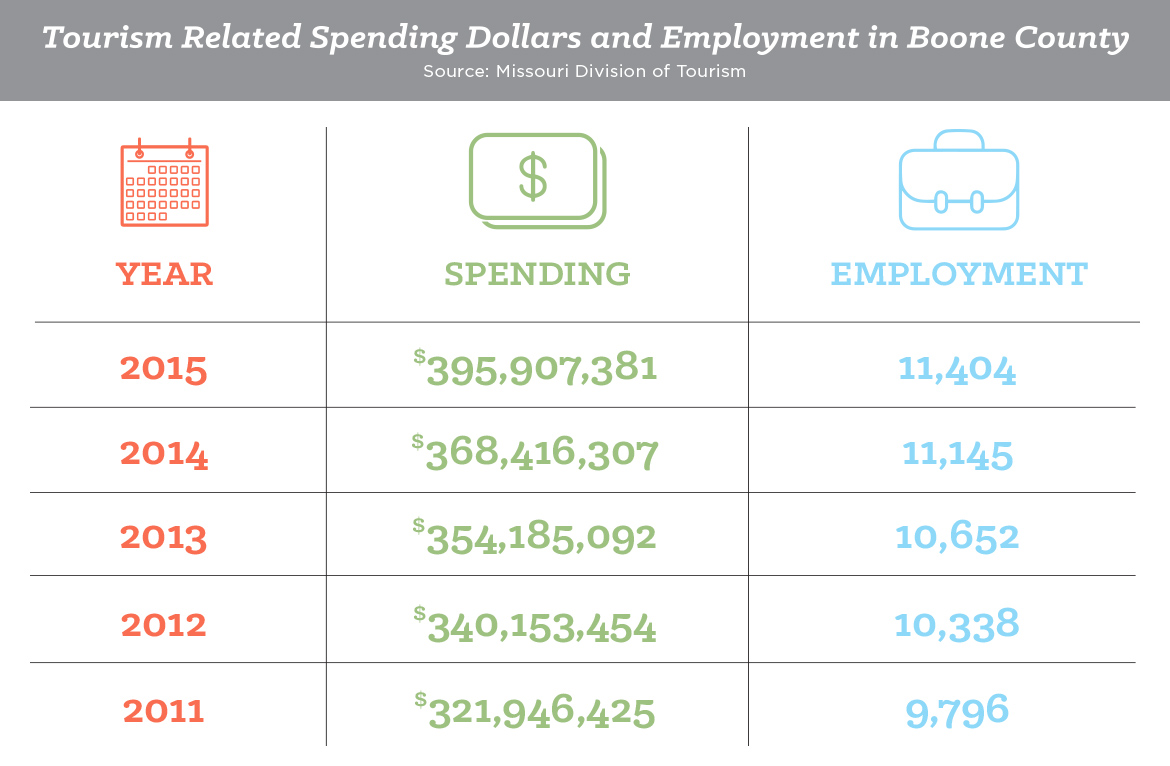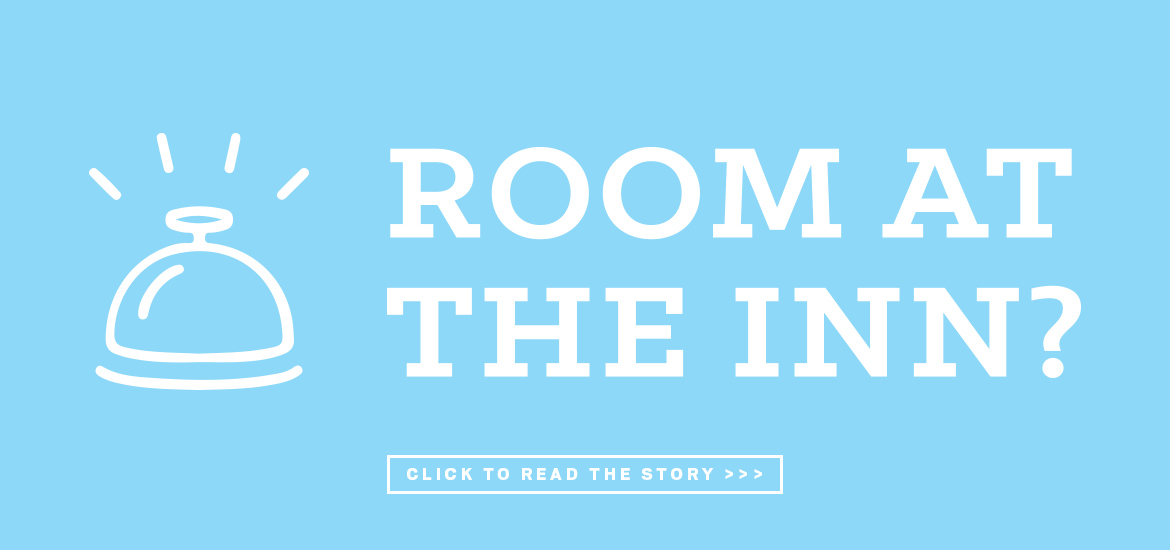The Weekender
 Events throughout the year keep Columbia’s tourism dollars rolling in.
Events throughout the year keep Columbia’s tourism dollars rolling in.
Grabbing a table in a restaurant or a seat at the bar can be tough in downtown Columbia on fall Saturdays. Just ask any lifelong Columbia resident.
For six or seven weekends a year, the city is alive with football fanatics, MU alumni, students, parents and out-of-town guests. These visitors fill restaurants, hotels, bars, shops and leave behind important revenue for Columbia businesses.
There’s no doubt that football weekends are important to business owners and the city’s overall revenue. A 2014 study showed that out-of-town fans contributed more than $31 million dollars to the Columbia and mid-Missouri economy in fiscal year 2013, while in-town fans contributed just less than $13 million. The study, crafted by MU MBA students along with the Chamber of Commerce and the Columbia Convention and Visitors Bureau, underscores the importance that MU athletics has on Columbia.
But what happens for businesses the rest of the year? Where does Columbia draw the rest of its guests from?
“We have 45 other weekends we have to fill,” says Megan McConachie, marketing and communications manager for the CVB. “That’s where all of this other stuff comes into play.”
Out-of-Towners
“This other stuff that comes into play” includes a plethora of events, from amateur sports to downtown festivals, all of which help bring visitors to Columbia and Boone County.
Some weekends are easy to fill. The Show-Me State Games, a three-week amateur sporting competition, has been a Columbia staple since its inception in 1985. Each year, the games bring thousands of athletes and spectators to the city.
In 2014, the Show-Me State Games had participants from 111 of Missouri’s 114 counties, with nearly 10,000 hotel stays and an estimated economic impact of more than $11 million dollars for Columbia.
“People in general just like Columbia,” says Emily Lorenz, marketing and media coordinator for the Show-Me State Games. “A lot of our athletes come from St. Charles or St. Louis. Some come from Kansas City. For them, everything is close-knit. It’s all a pretty close distance. They get the experience that they don’t have to travel far to go to the good restaurants. It’s kind of the opposite feedback we hear from Missourians who come from small towns. They love that there is shopping, more restaurants to offer and a little bit more for them to do when they don’t have a game. So it’s really just such a good fit for all of our athletes.”
While the Show-Me State Games are unlikely to leave Columbia, other events in the city offer less of a guarantee. The Missouri State High School Activities Association (MSHSAA) hosts its yearly championship events throughout the state. Columbia has held its own through the years when it comes to securing event bids, which can bring thousands of visitors — and revenue — to the city.
Columbia currently hosts championships in boys and girls basketball and wrestling. It will also have state golf championships in 2016-17 and 2019-20. In past years, Columbia hosted baseball, softball and football championships before those events moved to other cities.
The Roots N Blues N BBQ Festival in the fall and the True/False Film Festival in late winter bring thousands of visitors to the downtown area.
According to a 2013 study from the Convention and Visitors Bureau, Roots N Blues brings in more than $1 million for the city and state. In 2014, the event attracted more than 27,000 people from 43 states. In 2015, the event drew 24,000 fans from 42 states.
In 2011, True/False sold more than 15,000 tickets, with more than half of those coming from people outside of mid-Missouri. True/False co-founder David Wilson says he estimates there will be about 7,000 to 10,000 out-of-town guests for this year’s festival, about 40 percent of the overall attendees. In 2015, the festival sold more than 45,000 tickets.

Much of the out-of-town marketing for True/False is focused on towns within a seven-hour drive of Columbia, along with Chicago and Dallas. Besides the films, there will be guest speakers and more than 25 bands from around the country at True/False. Festival-goers will not only stay in Columbia hotels, but they’ll also eat in Columbia restaurants. This year’s festival takes place March 3 through 6.
“More than a handful of businesses have told me that True/False is their biggest weekend of the year,” Wilson says. “Especially for restaurants, it’s way better than a home football game because people are downtown all weekend long. They have breaks between movies. … They are going to spend three days where they spend three meals per day downtown.”
Katie Essing, executive director of The District, echoed Wilson’s sentiments about the impact True/False has on the downtown area.
“These events are important overall because they help bring in consistent traffic and sales,” she says. “[True/False] just transforms downtown with the multiple theaters and art institutes, and it draws people to downtown.”
Columbia Mall Traffic
In large college towns across the country, there is an old saying: the best time to go shopping is during a home football game. That certainly seems to ring true at Columbia Mall.
“If you’re coming from out of town to watch a football game, more than likely you’re going to try and experience something that is unique to Columbia, something that’s not in Kansas City or St. Louis,” says Rusty Strodtman, Columbia Mall senior general manager. “Most of those places have malls. They’re not here to shop.”
Strodtman says there are occasions where the mall benefits from home football games, such as when rainy weather or colder-than-expected temperatures force visitors to buy warm-weather clothes.
But for the most part, Columbia Mall draws out-of-town visitors other ways. Strodtman noted the mall is much busier during MSHSAA weekends, the Show-Me State Games and conventions for organizations like the Future Farmers of America and Future Business Leaders of America. On many weekends, visitors to the mall will notice a variety of high school letter jackets from all around the state. He says the mall’s sales trends show increased traffic and sales during conventions and events that attract school-aged kids and their families.
“If you’re coming from out of town to watch a football game, more than likely you’re going to try and experience something that is unique to Columbia, something that’s not in Kansas City or St. Louis.” — Rusty Strodtman
“Most of those kids are from small towns. So coming to Columbia is a big-town experience,” Strodtman says. “They don’t have a mall with retail and restaurants like Columbia has to offer. A lot of times, they come here for their entertainment.
Anything you get into the high school or junior high demographics, we get a lot more of those people coming to the mall than we see on a home football game. Seventy thousand people come to town for a football game, and I don’t feel it here.”
Since Columbia is the largest city in the area, many people come to Columbia as their shopping destination. While Strodtman says the mall is not able to do an accurate count of where all of its business comes from, a good portion comes from outside Boone County.
The mall draws from 24 counties total. Strodtman estimated that about 60 percent of the mall’s sales come from Boone County residents. August (back-to-school shopping) is the mall’s second biggest month behind December, and Strodtman notes that many of those sales come from customers outside of Boone County.
Keeping Events in Columbia
Events that bring out-of-town guests to Columbia are critical to the local economy. According to the Missouri Division of Tourism, tourism-related spending in Boone County was more than $395 million dollars in fiscal year 2015, supporting more than 11,400 tourism-related jobs.
“Tourists come and they spend the night, but they also eat in our restaurants, they shop in our stores, they fill up in our gas stations,” McConachie says. “So all the sales taxes they’re paying, those go to fund other city services. It would kind of have a ripple effect if something like that was to go away.”
So what does Columbia do to ensure it can keep events coming back year after year? In some instances, community support goes a long way.
That’s an important aspect for the Show-Me State Games. While the games are headquartered in Columbia, and will likely be a staple in the city for years to come, the community does its part to help make sure the games run smoothly. This includes help from Columbia Parks and Recreation, Columbia Public Schools and other entities from around the city.
Keeping MSHSAA events in Columbia requires a different approach, one that requires even more collaboration from different community groups.
“We act as a facilitator,” McConachie says. “We have a lot of connections all over town. So when you’re talking about something like MSHSAA, we want to get the university athletic department to the table. If there are Parks and Rec facilities, we want to get them to the table to facilitate that effort to make sure when we turn that bid in, it’s the best possible offer we can make. We offer up additional funding to help make that event as good as it can be. We really try to bring people together to make sure we can secure those events.”
Columbia briefly lost the state basketball tournaments in the late ’80s and early ’90s to Springfield, which left fewer weekends that the city could bring in out-of-town visitors. The city has hosted every MSHSAA basketball championship since 1992.
“That leaves a huge hole in your calendar,” McConachie says. “There are ways to fill that, seeking out other events. But having that working relationship that we’ve had for so many years [with MSHSAA], it’s so much more difficult to go out and try to recreate that in a bunch of other little pieces of business.”
Strodtman believes the city must continue to work together to not only retain events, but also to attract more events and groups to the city.
“Over time, we’re going to have to start not taking things for granted, become a little more aggressive in keeping those type of events coming to Columbia, because they are a big tourism draw,” he says. “Unlike Lake of the Ozarks, where they are always going to have the lake, we aren’t always going to have the tourism … We have to be very competitive to keep those events coming here.”



